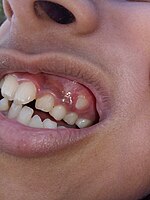
Photo from wikipedia
Objective To evaluate the effect of online follow-up on the quality of life of patients who undergo extraction of impacted mandibular third molars. Materials and methods This study enrolled patients… Click to show full abstract
Objective To evaluate the effect of online follow-up on the quality of life of patients who undergo extraction of impacted mandibular third molars. Materials and methods This study enrolled patients with impacted mandibular third molars who were treated at the Department of Oral and Maxillofacial Surgery of the Stomatological Hospital at Southern Medical University and divided them into test and control groups. The test group received an online follow-up on the first, third, and fifth days after tooth extraction, while the control group was not followed up with. Patients in both groups were reexamined on the postoperative seventh day, completing the postoperative symptom severity (PoSSe) scale to comprehensively and quantitatively evaluate their quality of life after tooth extraction. A visual analogue scale (VAS) was used to evaluate the degree of approval for an online follow-up after tooth extraction by 20 senior doctors (≥ 40 years old) and 20 young doctors (<4 0 years old). Results The PoSSe scale scores of the remaining options in the test group were significantly lower than those in the control group. The VAS score of senior doctors for online follow-up was significantly lower than that of young doctors. Conclusions A postoperative online follow-up effectively improved the quality of life of patients who underwent extraction of impacted mandibular third molars. Compared with senior doctors, young doctors were more likely to approve an online follow-up after tooth extraction. Clinical relevance Online medical care can be considered as an auxiliary tool to improve the effect of oral treatment.
Journal Title: Clinical Oral Investigations
Year Published: 2020
Link to full text (if available)
Share on Social Media: Sign Up to like & get
recommendations!